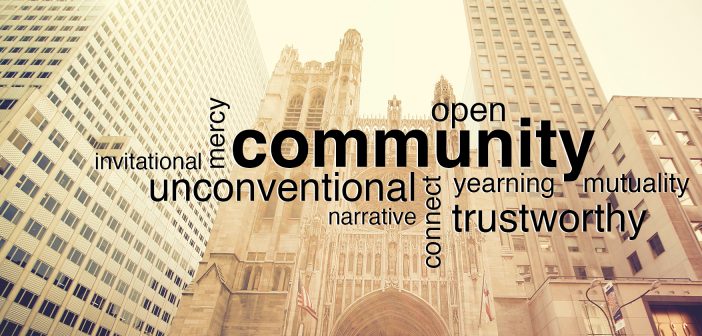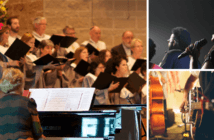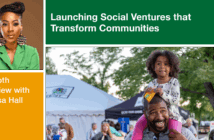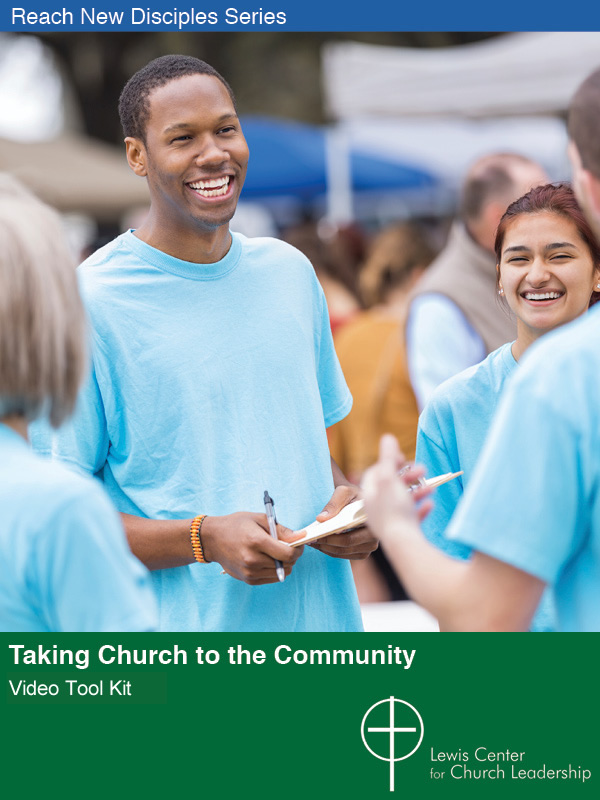Hal Knight and Doug Powe discuss nine characteristics of transformative Christian communities that allow them to nurture spiritual growth while also remaining open to others and connected to the broader community.
Whether starting a new church or renewing an existing congregation, leaders must be able to organize communities so that their members are growing in spiritual depth while also focusing outward. The acronym COMMUNITY highlights some of the characteristics of transformative Christian community. Congregations can successfully organize their communities around these characteristics — not simply for the purpose of adding people to the roll — but for greater discipleship.
Clarity of purpose allows a community to be open and yet cohesive. It does not matter if people come or go when everyone is committed to loving God and neighbor.
Connect
We cannot grow in love if we are not acting in love to others both in and outside the community. The tendency for too many congregations today is connecting with one another and then choosing either connecting with God or with those in the broader community. This is not usually a conscious choice. But to focus on spiritual growth while not reaching out to the broader community compromises that growth.
Open
One of the precursors to growth is an openness to others. There is something reassuring about seeing the same familiar faces week after week that provides stability in life. But when the stability of a community comes from their common purpose, it does not matter if people come or go because everyone is committed to the practice of loving God and neighbor. Clarity of purpose allows a community to be open and yet cohesive.
Mercy
The mercy we receive from God helps to shape our lives toward deeper piety, and the mercy we extend to others helps them experience God’s grace. The transformation of community is not possible without God’s mercy and the sharing of God’s mercy. A community shaped by mercy is a community where lives are changed because acceptance of all is more important than the victory of a few.
Mutuality
It is common to assume that those with economic means have something to give to those disenfranchised, while the disenfranchised do not have anything to give. In a transformational community, however, it is understood that all have something to contribute. While giving includes meeting economic needs, it encompasses so much more. The ability to really experience this sort of give-and-take requires a different mindset in the way we interact with one another. Mutuality should be at the heart of what it means to be in community.
Unconventional
Unconventional practices, such as John Wesley’s field preaching, can help us reach more people. But we should not think some magic thing exists that will solve all of our problems. We need to be creative in ways that fit our context, which requires that we truly understand our surrounding environment. A missional approach calls for us to be unconventional in connecting with others, but doing so as a means of furthering the work of community.
Narrative
Transforming communities keep the biblical narrative at the forefront of the community. The biblical narrative, not the pastor or leader, is the source of community life. We all have access to the narrative and through it are able to invite and sustain others in the community. The narrative shapes us toward a deeper love of God and neighbor. It provides a common language for inviting people into the community and sustaining them in faith. Simply put, transformative communities share a common narrative.
Invitational
The word “invite” in a Christian culture is not as straight forward as it seems. Typically when we extend an invitation, we give individuals information pertaining to some event, and once we do, our job is finished. Christian invitation goes beyond the simple sharing of information. Christians are extending an invitation to others to come to something, but the something is not a one-time event. It is a transformed life lived in a particular community for the rest of one’s days. This is the same invitation that Jesus extended to the disciples — to experience God’s transformation lived out in community.
Trustworthy
One of the challenges any community faces today is trust. Today, people are more wary of individuals who say they are interested in their souls, but really are not genuinely concerned about their well-being. We have to find ways to reach out to others that come across as authentic and not inauthentic. Being trustworthy will help a community to invite and sustain others on the journey.
Yearning
The word yearning is another way to describe our ultimate hope. The question is, “What is our yearning today?” Is it to be transformed into the likeness of Christ? Or is it to simply survive? A missional approach focuses on yearning for transformed hearts that enable us to daily love God and neighbor. It does not settle for anything less.
Not every congregation will exhibit all nine of these characteristics, or exhibit them to the same degree. Some will emphasize different characteristics depending on where they are on their journey. But always try to engage all nine in some manner. Transformation is never easy, but it is immensely satisfying when it deepens our relationship with God and enables us to bring others into a loving community.
This material was adapted from the book Transforming Community: The 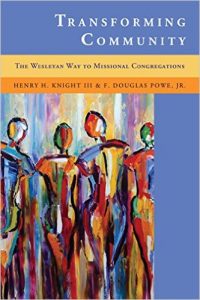 Wesleyan Way to Missional Congregations, by Henry H. Knight III and F. Douglas Powe, Jr. Copyright © 2016 Discipleship Resources, Nashville, Tennessee. All rights reserved. Used by permission. Transforming Community is available at Amazon.
Wesleyan Way to Missional Congregations, by Henry H. Knight III and F. Douglas Powe, Jr. Copyright © 2016 Discipleship Resources, Nashville, Tennessee. All rights reserved. Used by permission. Transforming Community is available at Amazon.
Related Resources
- Adopting a Missionary Mindset by Douglas Ruffle
- Your Community is Your Congregation by Joe Daniels
- Engaging Your Mission Field by Bob Crossman


